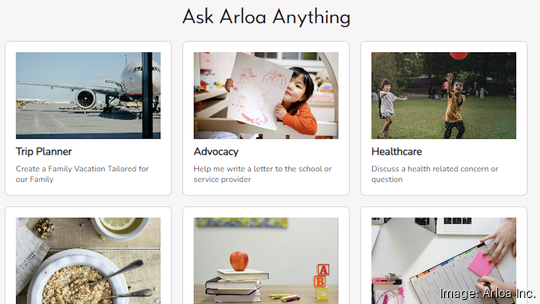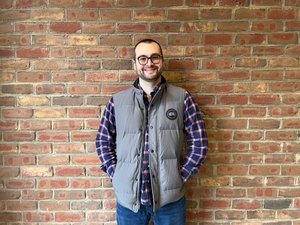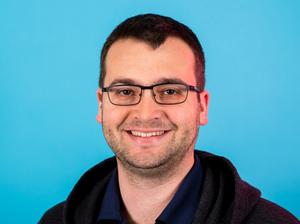
Following a successful acquisition, Ryan Sevey was a year into building his second VC-backed startup when his toddler was diagnosed with autism.
Navigating complex, unfamiliar processes and services such as special education and occupational therapy was the inspiration for Sevey's latest startup.
And the experience with the now-shuttered prior AI company led him to no longer seek venture capital.
Arloa Inc. uses AI to guide families through the special-needs journey, empowering them as advocates for their child's rights and needs.
"It really is like your own little personal advocate that knows your child," Sevey said in an interview.
"Unfortunately, I've talked to parents ... who have an extremely difficult time getting the services that their children are legally entitled to get," he said. "To me, this is an area where I can demonstrate AI can actually have a profound positive influence."
Sevey has espoused harnessing machine learning and AI for societal good through all three startups, and each new company represents a tech iteration on the one before. In contrast, Sevey is worried about AI applications in the wider market poised to displace workers.
Starting with a few beta testers late last year, New Albany-based Arloa is set to launch for customers this spring. The company was incorporated at the end of January, as Sevey's second startup was shutting down.
Jason Montgomery was co-founder and CTO of the two VC-backed startups. The two had met working in cybersecurity. (In the early 2000s Sevey had side hustles including website publishing, cybersecurity consulting and video game design.)
Nexosis Inc. applied machine learning to solve corporate problems like forecasting inventory or staffing a call center. It was acquired in 2018.
Launched in 2021, Mantium Inc. took that a step further by making it easier and safer for businesses to use generative AI to inform financial and strategic decisions. Columbus' Drive Capital and other VCs invested.
Several similar startups nationwide formed to fill technical gaps in large language models – and most would get obviated when giants like OpenAI would release features filling those gaps for themselves.
After a tumultuous half-year attempting to save Mantium, Sevey in a last effort pitched the board on the idea for Arloa. Directors recommended starting a separate entity instead. Mantium completed its shutdown in April.
"If Mantium had to die, it was probably better to just shut it down and start a new thing, because it is so radically different," Sevey said.
Where the previous two companies were largely subject-matter agnostic, Arloa is solving a very specific use case – the kind of deep dive into a niche that AI giants wouldn't pursue.
Arloa's seven employees all came from Mantium, which had about 30. Montgomery did not join, focusing instead on cybersecurity.
Will Gokey, a longtime friend of Sevey's whose family fund invested in both Nexosis and Mantium, is the only outside investor in Arloa. Sevey also is backing it with his own funds.
"I personally like Arloa a lot better than I liked Mantium," Gokey said. "It’s right at home for Ryan. He is his own use case; that makes it a much better product.
"This is something that makes things better, … empowers people to do things where previously you had to hire professionals do to it."
Arloa also is organized as a public benefit corporation – meaning societal good becomes a fiduciary duty. So the startup is unlikely to ever seek VC unless it's a fund aligned with the mission, Sevey said.
"The intent with Arloa is very counterintuitive to how venture thinks today," Sevey said. "We're not really optimizing this for billions of dollars of exit."
Why is Arloa needed? How does it work?
More than 7 million children received federally supported special education and related services as of 2022, according to the U.S. Department of Education. Advocates believe many millions more are not identified or haven't accessed services.
Just 23 states and territories meet requirements under the Individuals with Disabilities Education Act, or IDEA, for children and youth as of June 2023, according to the agency, and 25 meet IDEA requirements for infants and toddlers. Ohio moved to "meets requirements" last year after three years rated "needs assistance."
"There’s all these things that you have to now know as a parent when you have a child with special needs or or any type of learning disability," Sevey said.
About two in five mothers end up leaving the workforce to manage their child's care. Sevey said New Albany's district has done a good job, but he's heard from many parents facing obstacles elsewhere.
Families who can afford it turn to paid consultants at high hourly rates, he said. Arloa is a more affordable option.
Parents upload their child's formal evaluation reports and education plans. Arloa identifies applicable rights and services available under IDEA, and assembles the documentation required to receive an accommodation.
"It can even write letters to the school," Sevey said. "We also try to give parents recommendations and tips for what they can do at home.
"It understands their disability; it understands the progress that they're making; it understands what's working, what's not working, and it can adjust course."
Based on the child's diagnosis, interests, likes and dislikes, Arloa can help plan a family vacation, Sevey said.
Future features would include navigating other state and county services. For example, Sevey's family only recently learned a Franklin County waiver program would pay for occupational therapy they'd been funding out of pocket.
Subscriptions are about $10 monthly, part of which pays for the use of outside AI. The company is exploring formation of a separate nonprofit to help cover the cost for those who can't afford it, and asking employers to add it as a benefit.
"Being a public benefit corporation also helps," Sevey said. "A higher price point might actually lead to more revenue, but the downside is you exclude more families. To me, that's not acceptable.
"One of the beautiful things about not being venture-backed is we can make decisions that really align to (the) one metric at Arloa that we care about, and that's number of families helped," Sevey said. "Everything from that single metric, as it increases, will drive success."





